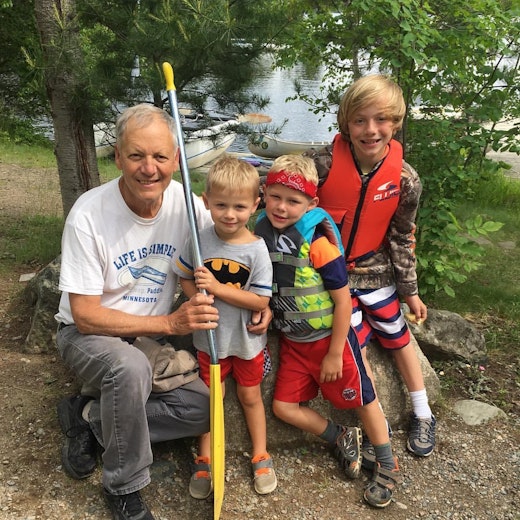
I believe wholeheartedly that Camp Voyageur groups move through the woods in the most responsible and efficient ways possible. Camp works hard to train its staff and inform its campers of the best environmental and safety practices. Still, it’s an ongoing process of learning and evolving, and even the most efficient group has its sluggish days. Here’s what I see as 10 of the most common mistakes made by folks at a campsite—not necessarily Voyageurs, mind you. Do you have any to add to this list? Let us know!
10. Not setting up the tent right away
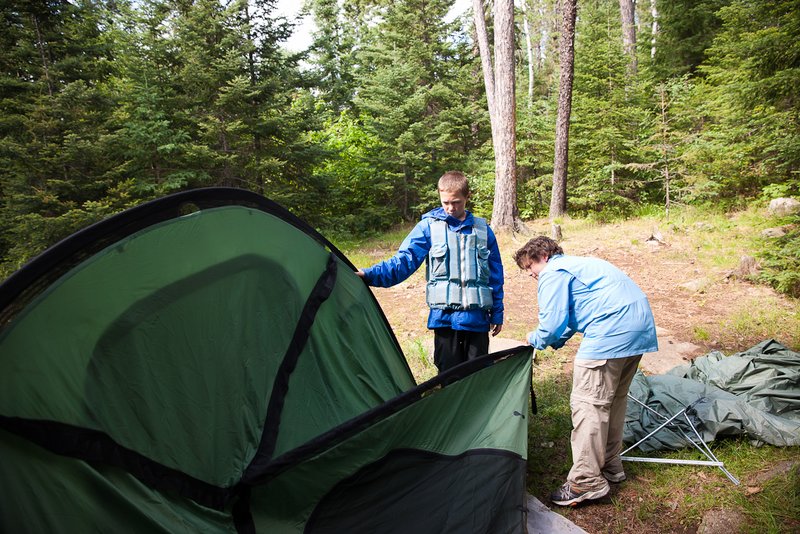
This is an easy mistake to make, and we’ve probably all been guilty of it at some point. Especially after the grueling days of paddling hard into the wind, it’s tempting to roll into a campsite, find a comfortable rock and just relax for a bit. Maybe even take a nap, munch on some gorp. But the longer you wait to set up the tent, the less you’ll want to do it. As the evening progresses, you and everyone else in your group will get busier with other tasks like finding firewood, hanging the food pack, drying out wet clothes and fishing. And once a big dinner (think sausage burritos with fresh veggies!) and thick cheesecake dessert are served, it will be even more difficult to find the motivation to set up that tent. For these reasons—not to mention the constant possibility of rain—it’s advisable to make setting up the tent your first campsite priority.
9. Improperly disposing of excess dinner
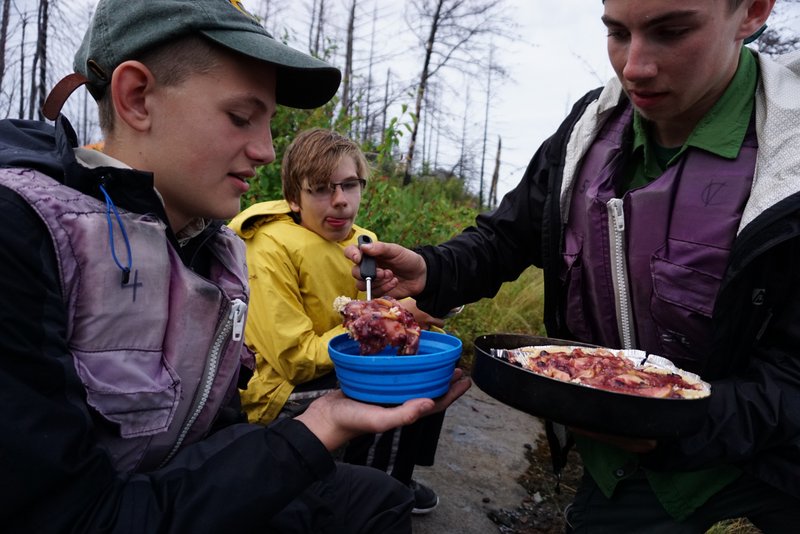
Camp Voyageur has long practiced Minimal-Impact Camping. Gone are the days when leftover noodles or pitas were simply dumped into the lake or chucked into the woods at the end of a meal. Nowadays, many canoeists think that marching 100 yards or so away from the lake shore and burying food waste underground is acceptable. The fact is, that’s not a good solution either, as the food might still be uncovered by scavenging animals farther inland (such as foxes, bears, birds, and rodents). The best way to dispose of excess dinner, of course, is to eat it. All of it. Counselors or trip leaders should always take special care to plan the meal sizes accordingly and avoid having any leftovers at all.
8. Gathering firewood from the wrong places

Campsites are designated for activities and usage by people, but the surrounding forest should be left relatively undisturbed whenever possible. On the flipside, a campsite should have a certain aesthetic beauty because its foliage is allowed to grow. Thus, finding firewood becomes a balance of not disturbing the deeper wilderness, but also never using wood that plays a prominent role in the campsite’s appearance. Following the Boundary Waters regulations of only gathering dead wood that’s lying on the ground is a good rule, of course, but there should also be constant use of one’s own (good) judgment in regards to gathering wood from appropriate places and not altering the appearance of the campsite space. And it goes without saying that you should only take enough wood to suit your immediate needs—there’s no need to leave a little pile for the next group; let them find their own wood when they arrive at the campsite.
7. Not knowing the route to the latrine

We’ve all been in this position at some point: it’s the middle of the night at a campsite and you’re lying awake in your tent because nature is calling. But unless you checked out the path to the latrine in the daylight, you might be in for a winding, frustrating route through the darkness. The fact is, many campsites have several trails leading into the woods—some are old latrine trails from years past, others might be animal paths, and some are just coincidental clearings made by fallen trees. It benefits you to scope them all out prior to going to sleep. Determine which one leads to the toilet, and get a generally idea of the topography of the path (big roots, protruding rocks, etc.) ahead of time.
6. Leaving the toilet paper roll at the latrine
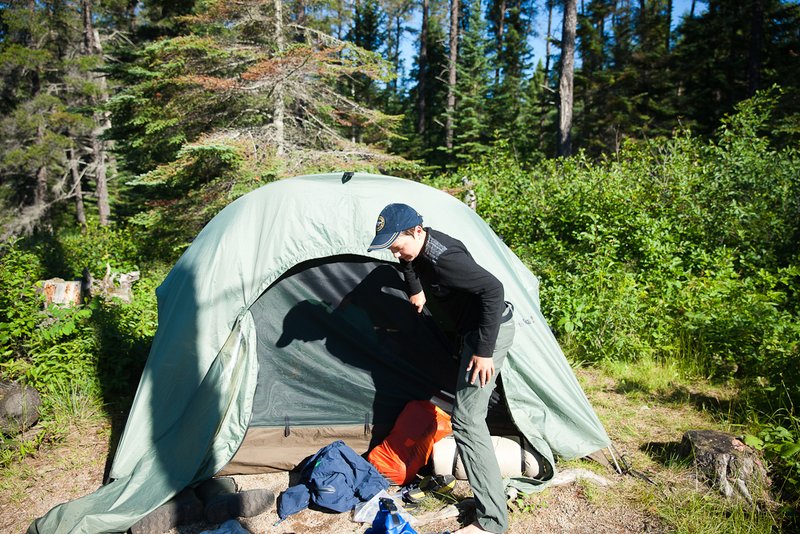
This point dovetails off of the previous idea. It seems logical to keep the roll of toilet paper at the latrine throughout the duration of your time at a campsite, but I advise against it. For one thing, “Save the toilet paper!” is probably going to be the last thing on anyone’s mind if rain starts to pour and you have other immediate campsite duties like storing packs underneath the canoes, putting way food, and getting your personal gear neatly into the tent. Beyond that, different people in the group might stow the roll of toilet paper in different areas near the latrine—one person might leave it on a nearby stump, another might leave it resting at the latrine’s base. That’s all fine, but it can lead to confusion at times when you might need the toilet paper the most. (Or, worse, it might lead to lost TP.) Avoid these problems by keeping the roll stored in the Utility Pack at all times when the latrine is not in use.
5. Forgetting to pull up the canoes
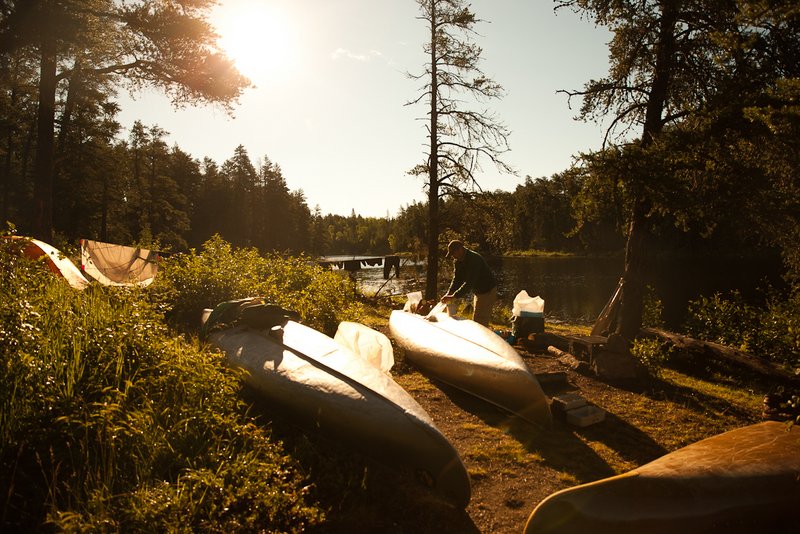
Just because it’s dark at the campsite and you’ve settled in for the evening doesn’t mean that Mother Nature has stopped to relax as well. Storms and strong winds can emerge in the middle of the night just as suddenly as they can during the day, and any canoes that are still docked partially in the water are at risk of getting swept away by waves or, in severe cases, blown—totally airborne—from your site. Whether the trip leader simply forgets to pull up the canoes on dry land before falling asleep or flat-out ignores the precaution, the result can be the same—a missing canoe in the morning. Luckily, Voyageur counselors are taught and trained to always pull up the canoes at night, but it’s still a practice that many non-Voyageurs often overlook.
4. Allowing CBS (cups, bowls, & spoons) to stay dirty overnight
Conscientious campers know that it’s best to hang your food back from a tree at night to keep it out of the reach of bears and other critters. Also, campers know that the pots and pans should be scrubbed and cleaned of any residual food or sauce after dinner. But if those precautions are so strictly adhered to, why do personal bowls, plates, and utensils often remain gunked up with food remains throughout the night? A bear or fox won’t decipher whether that delicious scent of spicy Ramen is wafting from a hanging food pack or a small bowl leaning against the fire grate—it’s all equally as tempting to him. One’s personal CBS should be cleaned immediately following a meal, and never stored inside a tent overnight.
3. Ignoring the surrounding areas

Many campsites in the Boundary Waters, Quetico, and nearby wilderness areas (such as Isle Royale) are positioned in really cool spots. There are unique rock formations within easy hiking distance, and picturesque bays that can be quickly paddled to. There might also be nearby streams that can be explored, portages that can be tried, secluded holes that can be fished, and pictographs that can be seen. Yet, instead of venturing out and scoping out these various offerings, many people seem content to find a campsite and then just lounge. Rest and relaxation after a long day are important, but it’s also essential to seize every opportunity for beauty and adventure that is presented to you.
2. Failing to review the map
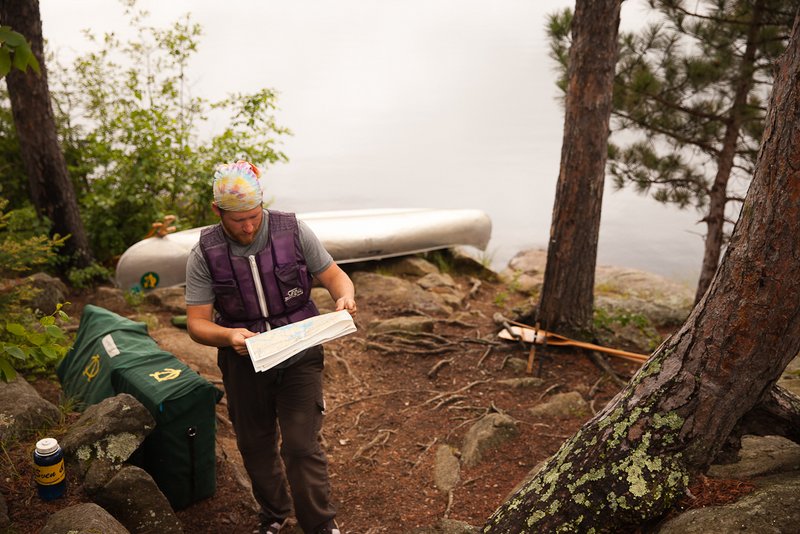
It always crushes my spirit when I ask a young camper where he went on his trip and he responds with something like, “I don’t know…we just paddled through a bunch of lakes.” That type of uncertainty is so unfortunate because stopping at a campsite for the night offers the entire group a perfect time and place to review the map together—to track the day’s progress and discuss the potential routes for the following day. Doing this also makes everyone feel “in the know,” which is so vital on the trail and enhances everyone’s sense of accomplishment after the challenging days. There’s a safety aspect to it too; simply, having everyone in the group aware of the surrounding geography is important.
1. Sleeping in

By far, this is the mistake that is made the most often at the campsite. Instead of enjoying the stunning sunrise with a hot cup of coffee, tossing a fishing lure into the lake to see if the fish are biting, or just enjoying the solitude and impeccable silence of the wilderness dawn, most people spend the a good chunk of the morning snoring away in their tent. This is particularly sad because I’ve talked to a number of people over the years that have cited an early morning sunrise wakeup as the single best moment of their entire camping trip. Young campers might not fully appreciate the splendor, but it’s worth rousing them anyway—it might end up being the highlight of their trip, and it might be the first time they’ve actually watched a sunrise.




